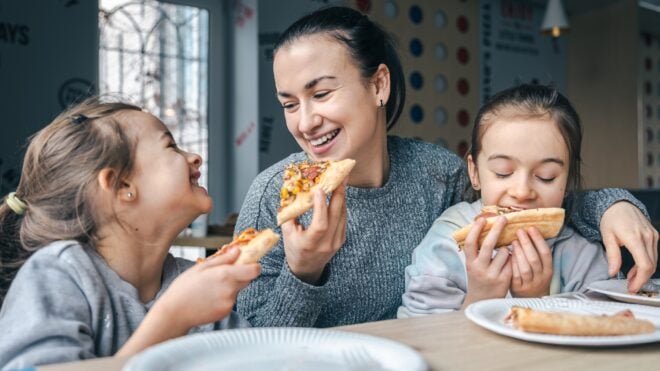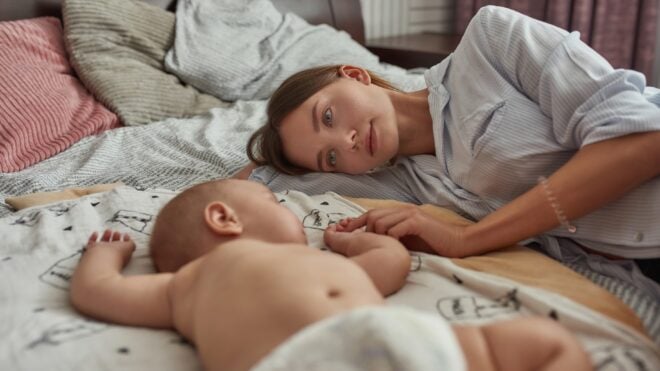America does not like the idea of dead children. As the mother of a child who has died, man, do I get it. I don’t like the idea of dead children either. I prefer my children alive and well, thank you very much. But, sadly, I know quite a few dead children—dozens, in fact.
Such is the plight of a mother whose child was diagnosed with cancer.
This year's Super Bowl featured a commercial (part ad/part PSA) from Nationwide Insurance that started cute and cuddly, with visions of kids on tricycles and wholesome suburban streets. It quickly ended in a gut punch with a young boy telling a massive audience of football fans that he would not grow up as a result of an accident. He would never be kissed by a girl, he would never travel the world, he would never get married.
Cue the social media backlash.
RELATED: Grieving the First Day of Kindergarten My Daughter Never Had
Apparently, it is not OK to harsh the Super Bowl’s mellow. Within minutes, folks all over were taking to Twitter and Facebook to condemn the ad. People want to drink beer, eat nachos, be titillated by the possibility of an exposed breast, watch grown men run into each other and not be burdened with thoughts of dead children, especially when their own children are right beside them watching the action.
I, myself, was not outraged.
After spending quite a few hours last night researching social media reactions to the spot, I felt sad, absolutely, but that sadness was as much about people’s reactions to the ad as it was to children who die. The level of anger and indignity in response to the ad was fairly epic. Viewers categorized it as tasteless, crass, cruel, brutal, insensitive towards parents of children who have died, depressing, grim, manipulative and unethical.
The truth is I am biased. I am damaged. I live in a world where I think of dead children every day, sometimes for many minutes throughout the day. Dead children are nothing new or foreign or mysterious to me. Dead children, sadly, are far too familiar. The dead children I know have names and are not merely actors on a screen, meant to make Americans squirm over the dangers of home accidents.
Watching an actor play a dead child while featured in an ad on Super Bowl Sunday—and then watching America’s reaction and mass outrage to him—hurts, I won’t lie. People fear dead children. They do their best to ignore their existence. It is basic human instinct, á la Darwin. I get it, I do. And yet, children die. This is fact.
Nationwide Insurance—and Lord forgive me for defending a freaking insurance company here—has a long history of promoting awareness of preventable home accidents dating back to 1954. I checked out the website of their “Make Safe Happen” campaign. It was informative, not offensive, and in no way was an attempt to sell me insurance.
I am here to tell you, the mother of a dead child, there is never a good or easy time to talk about how and why children die.
Nationwide does seem to have a vested interest in this mission of raising awareness of preventable home accidents—emphasis on preventable. That would include things like tip-overs (TVs and furniture falling on children), back overs (backing over a child in your car), drowning in bathtubs, poisoning from home chemicals and falls from high windows. Almost 8,000 children will die this year due to accidents, approximately 4,000 of those in the home.
None of those things are easy to consider. They are all horrible, actually. But does that mean they are not fit for discussion? And when might it be appropriate to inform us about the dire statistics of children dying? It seems most of us are not comfortable with it being done during the Super Bowl, especially with our children watching. So many of the comments I read were angry about just that—Nationwide forcing a discussion with young children about mortality and fear.
That sucks, I know. I’ve had those discussions on a regular basis for the past eight years. And let me tell you, it never gets easier. But I still have them. In our home, death is a part of life. It is not shielded. It is not whispered about. It just is.
Perhaps the ad was too much. Perhaps it was manipulative. I mean, of course the ad was manipulative. That is what ads do, they manipulate. Nationwide came out late last night to defend themselves against the backlash. Their intent, they stated, was to “start a conversation.”
RELATED: #LikeaGirl Ad Sweeps Super Bowl Social Media
Well, here we are, part of that conversation. Their ad worked. Tasteless, insensitive, grim—whatever reaction you had to it, it got people talking. Right now, most of that discussion is about the ad itself and anger over dead children inserting themselves at an inconvenient time.
I am here to tell you, the mother of a dead child, there is never a good or easy time to talk about how and why children die. There just isn’t. It is and will always be uncomfortable, awkward and difficult to talk about the death of a child. Nationwide knows this. They saw an opportunity to start a conversation and they took it. America responded with outrage, but I hope might possibly be a little more educated as a result.
Image via YouTube/NationwideInsurance




